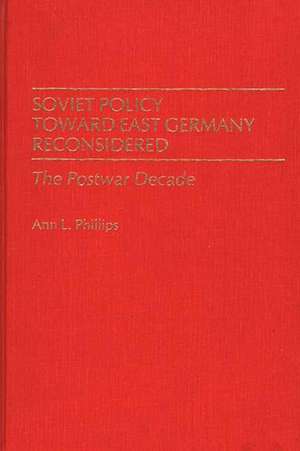Soviet Policy Toward East Germany Reconsidered: The Postwar Decade: Contributions in Comparative Colonial Studies, cartea 142
Autor Ann L. Phillipsen Limba Engleză Hardback – 30 sep 1986
This new study analyzes Soviet political and economic policies toward East Germany from 1945 to 1955, focusing on the transition from ambivalence to support. In her introduction Phillips outlines the postwar situation and reviews differing interpretations of Soviet policy. She reviews the issues of postwar settlement relating to East Germany and describes the conflicts within the Soviet leadership over German policy. Discussing Soviet economic exploitation of Germany and the harsh reparations policy, she contrasts these developments with the relatively moderate Soviet policies of socialization implemented in the same period, including improved consumption, economic aid, and toleration of private trade and production. She analyzes the factors that undermined the stability of the Ulbricht regime and culminated in the June 1953 uprising, creating an abrupt change of direction in Soviet policy toward the German Democratic Republic and East European bloc that existed prior to 1953. She argues that Soviet policies during the immediate postwar period were ambivalent, serving a mix of political and economic goals that were often incompatible, and that the Soviet commitment to incorporate East Germany into the Soviet bloc was not evident until after mid-1953.
Din seria Contributions in Comparative Colonial Studies
- 33%
 Preț: 321.17 lei
Preț: 321.17 lei - 28%
 Preț: 344.98 lei
Preț: 344.98 lei - 27%
 Preț: 378.18 lei
Preț: 378.18 lei - 38%
 Preț: 344.63 lei
Preț: 344.63 lei - 26%
 Preț: 353.55 lei
Preț: 353.55 lei - 28%
 Preț: 436.92 lei
Preț: 436.92 lei - 51%
 Preț: 300.68 lei
Preț: 300.68 lei - 26%
 Preț: 355.52 lei
Preț: 355.52 lei - 38%
 Preț: 439.44 lei
Preț: 439.44 lei - 38%
 Preț: 345.23 lei
Preț: 345.23 lei - 28%
 Preț: 462.12 lei
Preț: 462.12 lei - 38%
 Preț: 346.25 lei
Preț: 346.25 lei - 38%
 Preț: 438.24 lei
Preț: 438.24 lei - 24%
 Preț: 411.35 lei
Preț: 411.35 lei - 38%
 Preț: 437.15 lei
Preț: 437.15 lei - 28%
 Preț: 436.04 lei
Preț: 436.04 lei - 38%
 Preț: 438.41 lei
Preț: 438.41 lei - 33%
 Preț: 320.87 lei
Preț: 320.87 lei - 38%
 Preț: 441.04 lei
Preț: 441.04 lei - 38%
 Preț: 439.17 lei
Preț: 439.17 lei - 38%
 Preț: 509.28 lei
Preț: 509.28 lei - 38%
 Preț: 440.36 lei
Preț: 440.36 lei - 27%
 Preț: 379.20 lei
Preț: 379.20 lei - 38%
 Preț: 344.75 lei
Preț: 344.75 lei - 38%
 Preț: 438.51 lei
Preț: 438.51 lei - 38%
 Preț: 345.74 lei
Preț: 345.74 lei - 42%
 Preț: 253.80 lei
Preț: 253.80 lei
Preț: 438.59 lei
Preț vechi: 708.19 lei
-38% Nou
83.93€ • 87.80$ • 69.72£
Carte tipărită la comandă
Livrare economică 02-16 aprilie
Specificații
ISBN-10: 0313246718
Pagini: 274
Dimensiuni: 156 x 234 x 18 mm
Greutate: 0.56 kg
Editura: Greenwood
Seria Contributions in Comparative Colonial Studies

















